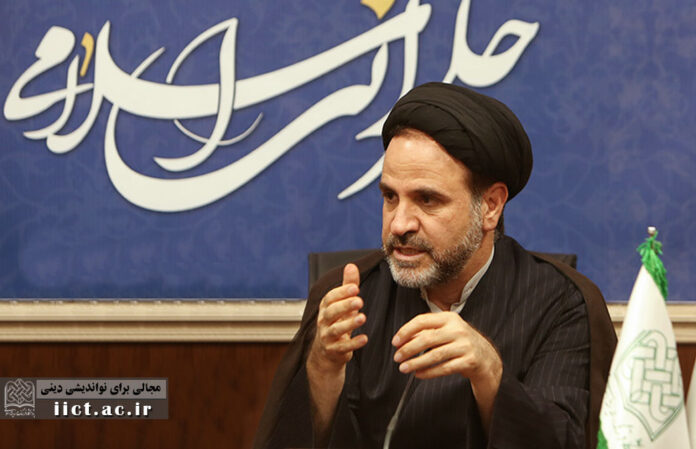According to the Public Relations Office of IICT, in an interview with Shafaqna, Hojjat al-Islam Sayyed Kazem Seyed Bagheri, Head of the Policy Group at the Institute, stated: “Arbaeen has generated a set of human and divine teachings, one of which is emphasized in religious thought: cooperation, mutual aid, and solidarity. During Arbaeen ceremony, one can observe this cooperation, mutual aid, and solidarity more than any other time. People and devotees of Imam Hussein (PBUH) offer everything they have to the pilgrims of Imam Hussein (PBUH) without any expectation. This demonstrates the grandeur that the Arbaeen ceremony and the Husayni school have created.”
He added: “Self-sacrifice and altruism are fundamental ethical teachings in all divine and even humanistic schools, and we see the most prominent manifestation of these values during Arbaeen. Therefore, Arbaeen holds significant and lofty capacities that all devotees of Imam Hussein (PBUH) should protect.”
The Head of the Policy Group at the Institute emphasized: “It is true that the Arbaeen ceremony commemorates the uprising of Imam Hussein (PBUH), which was conducted in opposition to oppression and tyranny. This ceremony serves as a tribute to keep that spirit of resistance and confrontation with injustice alive. However, we should also note that this ceremony has transcended its purely Shiite origins and possesses a sublime attraction that draws all Muslims, and even followers of other religions, towards it. To fully benefit from this grand ritual, we must strive to prevent it from becoming embroiled in sectarian, religious, or divisive disputes.”
He continued: “When considering the civilizational potential of Arbaeen, we must keep in mind that for a ceremony to have a civilizational approach, it must be capable of incorporating and embracing various religions, schools of thought, and perspectives. The discourse and intellectual scope of civilizations are trans-sectarian and transcultural.”
The Head of the Policy Group said: “In line with the civilizational aspects of Arbaeen, we should ensure that all lovers of Imam Hussein (PBUH) feel included in this great endeavor and seek their savior and teacher in this ‘university.’ This implies that the inclusivity and comprehensive nature of the ceremony should be expanded, making it not solely for a particular sect but rather broad and extensive enough to encompass all followers of Ahl al-Bayt (PBUH) and advocates of freedom, justice, and resistance against oppression.
He added: “Those with strategic and visionary perspectives must ensure that this ceremony does not fall prey to superstitions, social harms, or divisive issues. Instead, it should become a symbol and venue for unity among nations, ethnic groups, and religions. Sunni Muslims who come from distant countries with eagerness and enthusiasm should not feel that their sacred values are being insulted, as this would be highly destructive. Superstitions, divisive tactics, political games, and animosities can undermine the civilizational potentials present in Islamic thought and the Arbaeen discourse.”
He continued: “In a passage from the Arbaeen supplication, attributed to Imam Ja’far al-Sadiq (PBUH), we read:
اللّهُمَّ إنّي أشهَد أنَّهُ
‘O Allah, I bear witness that he…
بَذَلَ مُهجَتَهُ فيكَ لِيَستَنقِذَ عِبادَكَ مِنَ الجَهالَةِ وحَيرَةِ الضَّلالَةِ
… sacrificed his life for You to save Your servants from ignorance and confusion of misguidance.’
This eternal statement is a reminder to us that Imam (PBUH) gave his life to free people from misguidance and ignorance. Thus, we should view the Arbaeen ceremony as an unparalleled opportunity to remove ignorance, misguidance, and to enhance solidarity.”
Imam then highlighted a critical point:
قَد تَوازَرَ عَلَيهِ مَن غَرَّتهُ الدُّنيا وباعَ حَظَّهُ بِالأرذَلِ الأدنى
“Worldly people who were deceived by the allure of the world opposed Imam Hussein (PBUH) and allied with those who sold their afterlife reward for the lowest of worldly gains: ‘And those who were deceived by the world and sold their share of the afterlife for the lower, baser things.’ Here too, Imam (PBUH) reminds us that worldly obsession leads one to confront the divine light and Imam of society. Therefore, let us learn again that the Arbaeen ceremony should not be tainted by worldly pursuits and materialism. Just as hosts offer everything they have to the pilgrims of Hussein and forgo worldly possessions, guests should also adhere to the etiquette of pilgrimage, minimize their desires, and content themselves with the essentials.”




